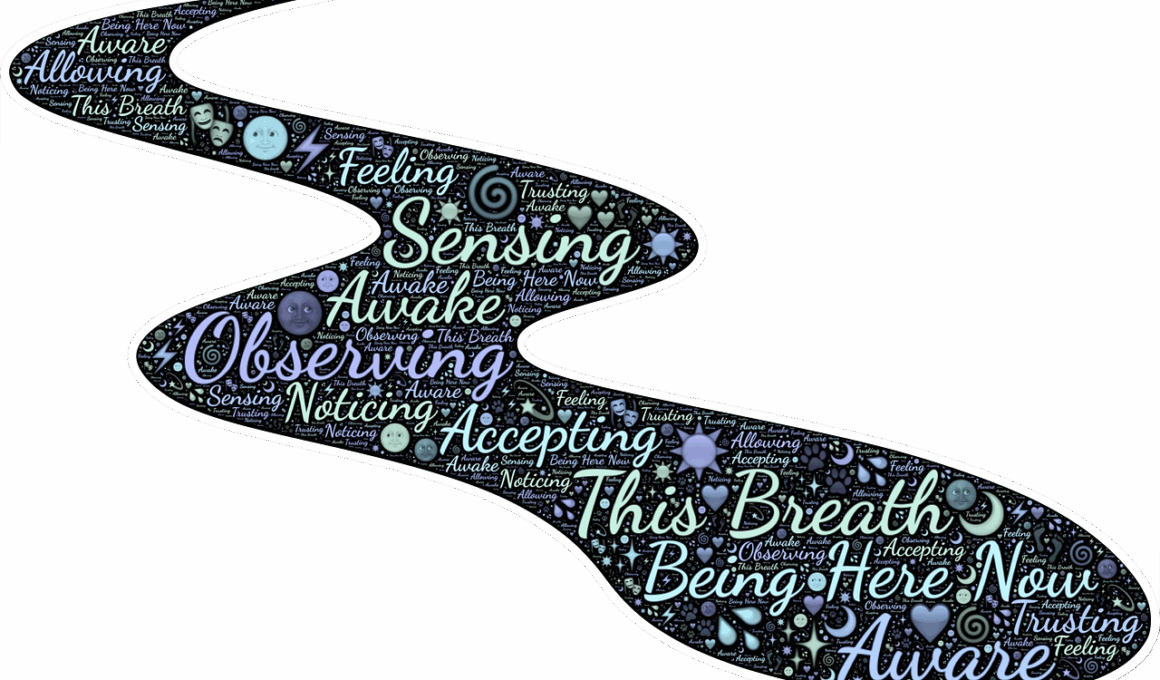The Importance of Nonjudgmental Awareness in Mindfulness
In the practice of mindfulness, nonjudgmental awareness is a foundational element that transforms our mental landscape. When we engage in mindfulness, we learn to observe our thoughts, feelings, and sensations without labeling them as good or bad. This open perspective fosters a deeper understanding of our internal experiences. Instead of reacting impulsively, nonjudgmental awareness encourages us to pause and examine our thoughts objectively. By doing so, we create space for reflection and insight, allowing ourselves to respond to situations more calmly. Furthermore, embracing nonjudgmental awareness cultivates compassion towards oneself and others. It alleviates the pressure to be perfect and recognizes our shared human experience. Through practice, we become more capable of accepting what is happening in the present moment without the urge to change it. This acceptance does not mean we condone negative behaviors; instead, we become observers of our thoughts and feelings, creating room for personal growth. Consequently, nonjudgmental awareness is not just a technique but a life-changing approach that enhances our overall mental health and emotional resilience, promoting inner peace and clarity.
Nonjudgmental awareness encompasses a variety of benefits that contribute to effective mindfulness practice. Managing stress is one of the most significant advantages. By accepting feelings without criticism or denial, we reduce the emotional charge tied to stressful thoughts. Instead of becoming overwhelmed, we learn to face challenges with a steady mindset. Additionally, nonjudgmental awareness enhances emotional intelligence. It allows individuals to understand their feelings deeply and recognize how these emotions influence behaviors and reactions. This comprehension fosters empathy, making it easier to connect with others emotionally. As practitioners develop their nonjudgmental stance, they often report improved relationships—with themselves and those around them. Moreover, research indicates that nonjudgmental awareness helps reduce symptoms of anxiety and depression. By learning to detach from negative thought patterns, individuals can break the cycle of rumination and self-criticism. In essence, integrating nonjudgmental awareness into daily life is a crucial strategy for mental wellness. It encourages a balanced perspective, promoting a soothing and enriching mindfulness experience that activates inner peace and resilience against life’s inevitable challenges.
Developing Nonjudgmental Awareness
Developing nonjudgmental awareness requires dedication and regular practice. As with any skill, mindful techniques must be applied consistently over time for them to become ingrained. Simple practices like mindful breathing or body scans can help cultivate this awareness. Begin by finding a comfortable position and focusing on your breath. Observe the sensations of inhaling and exhaling without attempting to control the rhythm. If distracting thoughts arise, gently acknowledge them and return your attention to your breath. Over time, this exercise teaches us to let go of judgments about our thoughts or feelings. Furthermore, journaling can be an effective tool for fostering nonjudgmental awareness. By writing down our thoughts without censorship, we create a safe space to explore our inner dialogues. In doing so, we gain insight into our habitual judgments and expectations. Attending mindfulness meditation classes can also provide additional guidance. In a supportive community, sharing experiences and challenges can enhance motivation and accountability. Ultimately, the journey to nonjudgmental awareness is unique for each individual, and it’s essential to be patient and compassionate with oneself throughout this process.
Mindfulness practices often challenge our ingrained reactions and perceptions. Nonjudgmental awareness teaches us to recognize and understand these patterns without automatic responses. This involves acknowledging societal conditioning that can contribute to harsh self-judgments or critical thoughts toward others. Our upbringing and cultural influences shape the way we perceive situations and people. By adopting a nonjudgmental stance, we gain the power to question these automatic beliefs. Engaging in reflective practices allows us to explore the roots of our judgments and challenge their validity. As we begin to understand these perceptions, it enables us to let go of preconceived notions and embrace a more expansive view of our experiences. Nonjudgmental awareness thus fosters an inclusive mindset. This perspective influences our interactions with others, reducing conflict and enhancing mutual understanding. Consequently, the benefits expand beyond personal mindfulness practice, offering improved interpersonal skills and strengthening personal relationships. This shift in awareness encourages a sense of community and connectedness as we recognize shared vulnerabilities, allowing for honest communication and authentic expression.
Barriers to Nonjudgmental Awareness
Despite the numerous benefits of nonjudgmental awareness, several barriers can hinder progress in mindfulness practice. One prominent obstacle is the tendency towards self-criticism. Many individuals struggle with inner dialogues that reinforce negative beliefs about themselves. This harsh self-talk creates a barrier that prevents them from viewing their experiences without judgment. Habitual criticism can become so ingrained that it feels impossible to escape. Cultural expectations can also contribute to this challenge, with society often placing immense pressure on individuals to conform to certain standards. Additionally, fear of vulnerability can hinder our willingness to accept our experiences as they are. When we are afraid of experiencing uncomfortable emotions or facing our flaws, it becomes difficult to embrace nonjudgmental awareness. Consequently, this leads to avoidance behaviors that restrict personal growth. Furthermore, comparisons to others exacerbate feelings of inadequacy and judgment. This internal competition can create a toxic environment where acceptance and self-compassion are elusive. However, recognizing these barriers is the first step toward overcoming them, allowing individuals to gradually cultivate a more nonjudgmental awareness.
Another significant barrier is our fast-paced, high-stress lifestyles that leave little room for mindful reflection. In a world dominated by technology and constant connectivity, taking breaks to cultivate awareness often seems like a luxury. The urgency to meet deadlines and performance expectations leaves less time for self-care. This contributes to a reactive mindset characterized by hasty judgments. Additionally, many individuals struggle to prioritize mindfulness practice amidst daily responsibilities, viewing it as an added task. In reality, integrating mindfulness into everyday life is essential for developing nonjudgmental awareness. It is beneficial to incorporate mindfulness in small snippets throughout the day. For example, engage in mindful eating by paying attention to the taste and texture of food, or practice mindful walking while observing your surroundings. These small moments can help create a continuous connection to the present moment. Over time, these practices can shift the perception of mindfulness from an obligation to a nurturing act of self-care. Thus, it becomes essential to find feasible ways to weave nonjudgmental awareness into our busy lives, ultimately enhancing personal well-being and fulfillment.
The Path Forward
Cultivating nonjudgmental awareness is a lifelong journey, one that offers profound benefits for mental health and interpersonal relationships. As you continue to explore mindfulness, consider setting personal intentions that align with your goals for developing nonjudgmental awareness. Acknowledging the progress you’ve made, no matter how small, can enhance your motivation. Remember that self-compassion is a vital aspect of this journey. Each experience, whether challenging or uplifting, contributes to your growth and understanding. It is also essential to seek support when needed, be it through mindfulness groups, therapy, or community workshops. These resources can provide valuable guidance and a sense of accountability. Practicing together can foster connection and shared learning, reinforcing your commitment to mindfulness. It’s worth noting that nonjudgmental awareness evolves over time, adapting to changing circumstances and personal growth. By remaining patient and open, you can embrace the unpredictability of this process. Ultimately, integrating nonjudgmental awareness into your daily life lays the groundwork for a calmer, more fulfilling existence. Embracing this journey with kindness towards yourself will enhance your quality of life, making mindfulness a profound and transformative experience.
In conclusion, nonjudgmental awareness is a critical component of mindfulness that can significantly enhance overall well-being. By observing our thoughts and experiences without judgment, we create a foundation for emotional resilience, improved relationships, and cognitive clarity. The practice encourages us to accept our experiences as they are, fostering a sense of peace amidst the chaos of life. It is essential to remain aware of the barriers that may arise on this path and approach them with patience and curiosity. Developing nonjudgmental awareness will empower us to break free from automatic reactions, enabling a more compassionate interaction with ourselves and others. As we incorporate mindfulness practices into our daily routines, we must remember the importance of celebrating our journey. Each moment spent engaging in nonjudgmental awareness strengthens our ability to navigate life’s challenges with grace and ease. Therefore, let’s commit to maintaining this perspective, nurturing it over time. The willingness to practice mindfulness is a gift we can give ourselves, ensuring a brighter outlook on life. Nonjudgmental awareness deeply empowers individuals, prompting positive changes within ourselves and fostering meaningful connections with others.


